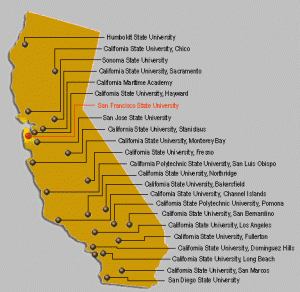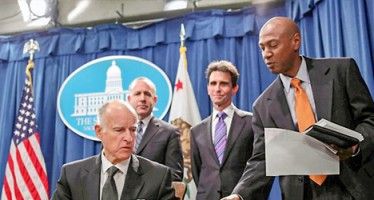Cal State Foundation bonuses pose conflict of interest
By John Hrabe
Following public outcry over six-figure pay raises handed out to top executives, the California State University Board of Trustees approved a plan last week to shift future pay hikes from taxpayer funds to nonprofit auxiliary foundations. The decision effectively freezes the amount of tax dollars spent on the college’s executive compensation, and Cal State officials hoped that would be enough to bring closure to the issue.
“Hoping we can put this issue 2 rest at CSU Trustees meeting. Prez Salary Freeze w/ taxpayer $ is right move,” newly confirmed Cal State Trustee Steve Glazer posted on Twitter. State Superintendent of Public Instruction Tom Torlakson, an ex-officio member of the board, praised the action as “a significant step in the right direction.”
But, the new policy that was intended to quell public criticism of Cal State’s spending practices has some ethics experts questioning whether it creates a conflict of interest, or the appearance thereof, for the college foundations. That’s because Cal State presidents commonly maintain a powerful influence over the foundation boards, according to a CalWatchDog.com analysis of the governing documents for more than a dozen auxiliary groups.
The Cal State University chancellor and the presidents of nine campuses all serve as voting members of their respective foundations, which now have the authority to supplement presidential salaries and benefits. The campuses are Bakersfield, Channel Islands, East Bay, Humboldt, Long Beach, Sacramento, San Diego, San Jose and Sonoma State.
“It is my belief that the foundations have always operated as a slush-fund for presidents,” Kevin Wehr, president of the Sacramento State University chapter of the California Faculty Association, told CalWatchDog.com. “When foundation money is used to remodel presidents’ homes and kitchens, one really has to wonder how this benefits the direct instruction of students–especially when the amounts of money are the equivalent of 100 course sections or more.”
College presidents not only serve as ex-officio members of the foundation board of directors. In many cases they serve as an executive officer of the foundation, have unrestricted authority to control board appointments and veto any changes to the foundation bylaws. And one Cal State president even has the power to remove a foundation board member at any time—for any reason.
“The CSU Board of Trustees’ decision to use funds from college foundations to pay for raises for campus presidents does raise some questions,” said Loyola Law School Professor Jessica Levinson. “If college presidents are in control of these college foundations, then it raises at least a question of the appearance of a conflict of interest.”
State Law Bans Self-Dealing by Foundation Board Members
State conflict of interest laws prevent auxiliary organizations from self-dealing. California Education Code Section 89906 stipulates: “No member of the governing board of an auxiliary organization shall be financially interested in any contract or other transaction entered into by the board of which he is a member, and any contract or transaction entered into in violation of this section is void.”
Michael Houston, a partner at the Newport Beach firm Cummins & White, LLP and expert on government ethics, says this provision is likely a problem for Cal State’s new pay policy.
“This seems not only to be a conflict, then, but a likely problem under 89906,” he said. “That would particularly be the case if the president could be said to have the ability to influence the other board members despite the president being unable to vote.”
Cal State presidents have numerous ways of influencing other foundation board members. Five foundations — one for the statewide CSU and the foundations for four campuses, Bakersfield, East Bay, Long Beach and Sonoma — grant the college’s top executive a leadership position as president, chair, secretary or CEO of the foundation. In turn, the executive position occasionally vests the president with the power to choose the organization’s executive director and other key personnel.
But, paid employees are far from the only foundation members with a favor to return.
Boards Hand Picked by President
“All Directors must be approved by the University President,” mandates Article II Section 1 of the San Jose State Foundation’s bylaws. In other words, the foundation board members owe their appointment directly to the president. Eight other Cal State presidents — at Channel Islands, East Bay, Humboldt, Long Beach, Sacramento, San Diego, San Francisco and Sonoma State — have similar appointment powers.
If an unfriendly board member were able to sneak through this presidential approval process, he or she might be able to convince the board to curb the president’s authority. But such renegade board members at Channel Islands, East Bay, Humboldt, San Diego and San Francisco would be stymied, again. These five Cal State presidents must sign off on any amendments to the foundation’s bylaws.
“These Bylaws may be amended or repealed, subject to the provisions of the Law, only by the approval of the Board and with the written consent of the President of SDSU,” states Section 6.4 of the Campanile Foundation, San Diego State University’s nonprofit auxiliary. SDSU also goes one step further, requiring “the written consent of the President of SDSU” for any changes to the organization’s articles of incorporation.
Sonoma State Foundation’s Past Self-Dealing
But the most sweeping presidential power lies with Sonoma State’s foundation. Of the dozen college auxiliary groups reviewed by CalWatchDog.com, only Sonoma’s bylaws grant the president unrestricted power to remove a board member. Under Article II, Section 4, “A member of the Board may also be removed from office by decision of the President of Sonoma State University.”
Cal State faculty members like Wehr see this arrangement of supplemental foundation payments as a potential conflict of interest. “If campus presidents were to receive additional compensation from private donors, one would have to ask: ‘Who do they work for, and to whom will they owe their allegiance?’”
Wehr’s fears of potential conflicts aren’t entirely theoretical. In 2011, the Santa Rosa Press Democrat reported that more than $9 million in foundation loans were funneled to Clem Carinalli, a former foundation board member. The Sonoma real estate developer convinced the board to loan him money just two days after resigning his position on the nonprofit’s board. “Two of Carinalli’s loans from the foundation are still outstanding — one for $1.25 million and another for $232,500, according to McNeill and the foundation’s most recent annual financial filing,” the paper originally reported.
Conflict of Interest Exception Doesn’t Apply
Sonoma State foundation’s loans to a bankrupt developer might appear to be a blatant conflict, but state law grants some exceptions to the conflict of interest policy. Section 89907(b) allows auxiliary organization to engage in a transaction if the board believes the contract “is just and reasonable as to the auxiliary organization at the time it is authorized or approved.”
Could the same exception be applied to the new presidential pay policy?
Houston doesn’t think that the 89907(b) exception would apply to college presidential bonuses “because it is basically giving money to a director/president where there is nothing of value given to the auxiliary in return.”
He added, “It would appear that a director/president could NEVER take advantage of Section 89907” because state law prohibits the exception from being applied when “the contract or transaction is between an auxiliary organization and a member of the governing board of that auxiliary organization.”
Senator Leland Yee: Cal State is Beyond Tone Deaf
State Senator Leland Yee, D- San Francisco, who has been one of the most vocal critics of Cal State’s executive compensation policies, isn’t about to let up. “The trustees are beyond tone deaf; they are either completely oblivious or simply don’t care what students, lawmakers, and taxpayers think,” he said. “As I said last week when the Chancellor proposed this new policy, it is nothing more than smoke and mirrors disguised as reform.”
“All efforts — including the campus foundations — should be focused on ways to ensure tuition is affordable and quality courses are available, not finding new ways to line the pockets of top administrators and giving corporations another means to cozy up to campus presidents for their own financial gain,” he wrote in a statement following last week’s policy change.
One Republican Senator echoed Yee’s criticism of Cal State.
“CSU’s leaders are proving over and over again that they’re incapable of being good stewards with taxpayers’ money: the $400,000 executive salaries, the tapping of Foundation money to cover-up these outrageous salaries,” State Senator Joel Anderson, R- Santee, told CalWatchDog.com. “How can the Governor keep a straight face while asking Californians to approve higher taxes while CSU bureaucrats continue to demonstrate their disdain for taxpayers?”
Four Cal State executives currently receive thousands of dollars in annual supplemental payments from college foundations, including $50,000 for San Diego State’s Elliot Hirshman, $25,000 for San Jose State’s Mohammad H. Qayoumi and $30,000 for CSU Chancellor Charles Reed and Cal Poly San Luis Obispo’s Jeffrey Armstrong.
These foundation payments are in addition to a state-funded compensation package that includes housing and car allowances, retirement benefits, health care and other miscellaneous employment-related benefits. In 2009-10, Cal State Los Angeles president James Rosser reported $515,612 in government compensation to the IRS.
Related Articles
Supreme Court effectively upholds CA affirmative-action ban
Today the U.S. Supreme Court upheld Michigan’s ban on affirmative action. Justice Anthony Kennedy wrote: “There is no authority in
Brown increases power over UC
With NFL playoffs and BCS championship here, on whom would you bet? The four-term governor of California, who learned politics
Ruling Slows Anti-Walmart Forces
SEPT. 13, 2010 By DAVE ROBERTS There are few companies more successful – and more loathed by liberals – than





